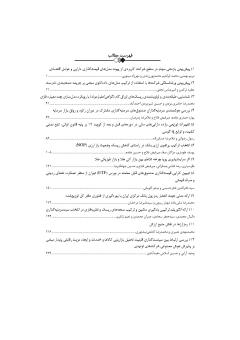بررسی هوشمندی سرمایهگذاران صندوقهای سرمایهگذاری مشترک در دوران رکود و رونق بازار سرمایه
محورهای موضوعی : بورس اوراق بهادار
بهاره حیدری مقدم
1
,
میر فیض فلاح
2
*
![]() ,
غلامرضا زمردیان
3
,
غلامرضا زمردیان
3
1 - گروه مدیریت مالی، واحد تهران مرکزی، دانشگاه آزاد اسلامی،تهران، ایران
2 - گروه مدیریت بازرگانی، واحد تهران مرکزی، دانشگاه آزاد اسلامی، تهران، ایران
3 - گروه مدیریت مالی، واحد تهران مرکزی، دانشگاه آزاد اسلامی، تهران، ایران
کلید واژه: جریانات نقدی, سرمایهگذاران حقیقی, هوشمندی سرمایهگذاران, دوران رونق بازار سرمایه, سرمایه گذاران حقوقی,
چکیده مقاله :
هدف این پژوهش بررسی توانایی سرمایهگذاران صندوقهای سرمایهگذاری در پیشبینی عملکرد صندوقهای سرمایهگذاری مشترک و انتخاب صندوقی با بازدهی بالاتر میباشد. برای پیشبینی اینکه آیا سرمایهگذاران و وجوه نقدی که از سوی آنها وارد صندوقهای سرمایهگذاری میگردد توانایی انتخاب صندوق کاراتر را دارد یا خیر، در ابتدا اطلاعات 34 صندوق در بازه زمانی 1391 تا 1399 جمعآوری شده تا هوشمندی وجوه نقد مورد بررسی قرار گیرد. در همین راستا دورههای رونق و رکود بازار سرمایه از یکدیگر تفکیک شده و توانایی سرمایهگذاران در هریک از این دوران مورد بررسی قرار گرفت تا مشخص گردد که آیا سرمایهگذاران در دورههای مختلف بازار به صورت متفاوتی عمل کردهاند یا خیر. همچنین سرمایهگذاران حقیقی و حقوقی از یکدیگر جدا شده تا عملکرد هر یک به صورت جداگانه مورد بررسی قرار گیرد. با استفاده از مدل چهارعاملی کارهارت، بازده تعدیل شده در برابر ریسک صندوقها به منظور بررسی هوشمندی سرمایهگذاران محاسبه شده که نتایج تحقیق حاکی از آن بود که سرمایهگذاران در هنگام ورود پول در حالت رونق بازار و همچنین هنگام خروج پول در حالت رکود بازار هوشمندانه عمل کردهاند.
The purpose of this study is to investigate the ability of mutual fund investors to predict the performance of mutual funds and select a fund with higher returns. To predict whether investors and the cash they enter into investment funds will be able to select a more efficient fund, first, the information of 34 funds in the period 2012 to 2020 was Collected to examine the intelligence of cash. The economic prosperity periods of the market were then examined separately to determine whether investors had acted differently in different market periods. Also, real and legal investors are separated from each other to examine the performance of each separately. Using Carhart's four-factor model, the adjusted return on risk of the funds was calculated to assess the intelligence of investors, which showed that group of real and legal investors, at the time of entry during market blooming and at the time of exit money during market stagnation act wisely in mutual funds.
_|23- Elton, E., Gruber, M., & Blake, C., (1996), The Persistence of Risk-Adjusted Mutual Fund Performance. Journal of Business, 69(2), 133-157.
24- Fallahi, firouz. PourabdalhanQuech, Mohsen.Bahboodi, Davood. Mohseni Zanozi, Fakhri Sadat. (2012). «The Asymmetric Effects of Oil Revenue Shocks on Output in Iran Using Markov - Switching Approach». Iranian energy economy research journal. Volume 2, Number 7, Pages 103-127. (in Persian).
25- Feng, X., Mingshan, Z., & Chan Kam, C., (2014). smart money or dumb money? A study on the selection ability of mutual fund investors in China. The North American Journal of Economics and Finance, 30(3), 154-170.
26- Frazzini, A., Lamont Owen, A., (2008). Dumb money: Mutual fund flows and the cross-section of stock returns. Journal of Financial Economics, 88(2), 299-322.
27- Garoosi, morteza. (2018). Smart money effect among investors of active mutual funds. Tehran. thesis for the M.Sc. Sharif University of Technology. Faculty of Management and Economics. (in Persian).
28- George J. Jianga, H. Zafer Yuksel. (2017). What drives the “Smart-Money” effect? Evidence from investors’ money flow to mutual fund classes. Journal of Empirical Finance. 39–58.
29- Gharghori, Ph., Mudumba, S. Veeraraghavan, M., (2007). How Smart Is Money? An Investigation into Investor Behaviour In the Australian Managed Fund Industry. Pacific-Basin Finance Journal, 15(5), 494-513.
30- Gorbani, hadi. (2012). An Investigation of Stock Selection Ability between Institutional and Individual Investors (Evidence from Stock Exchange of Tehran). thesis for the M.Sc. Mazandaran University Faculty of Administration and Economic Sciences.
31- Hosseini Fahragi, Ehsan. (2019). investigating the effect of inflows and outflows on the dilution of returns of mutual investment funds in Iran. Tehran. thesis for the M.Sc. Sharif University of Technology. Faculty of Management and Economics. (in Persian).
32- Hosseini, Seyed Ali. Hosseini, Seyed Hossein. Jafari Bagherabadi, Ehsan. (2013). «Investigating the Relationship between Mutual Funds Flows and the Stock Index in Tehran Stock Market». Financial Research Journal, Volume 15, Number 2, Tehran, Pages 201-214. (in Persian)
33- Hsin-Yi Yu, (2012). Where are the Smart Investors? New Evidence of the Smart Money Effect. Journal of Empirical Finance, 19(1), 51-64.
34- Keswani, A., & Stolin, D., (2008), Which money is smart? Mutual fund buys and sells of individual and institutional investors. Journal of Finance, 63(1), 85-118.
35- Lynch, A. W., & Musto, D. K. (2003). How investors interpret past fund returns. The Journal of Finance, 58(5), 2033-2058.
36- Munoz, Fernando. (2019). The ‘smart money effect’ among socially responsible mutual fund investors. International Review of Economics and Finance. 160–179
37- Salganik, Gall (2012). The Smart Money Effect: Retail versus intuitional mutual funds. The Journal of Behavioral Finance & Economics, 3(1),21-71.
38- Sapp, T., & Tiwari, A. (2004). Does Stock Return Momentum Explain the Smart Money Effect? Journal of Finance, 59(6), 57-82.
39- Shanken, jay. (1990). Intertemporal asset pricing: An Empirical Investigation. Journal of Ecomometrics. 99-120.
40- Sorros , John N. (2001). Equity Mutual Fund Managers Performance in Greec, Journal of Managerial Finance, 68-74.
41- Vishwanath, S.R., & Krishnamurti, C. (2009). Investment Management: A Modern Guide to Security Analysis and Stock Selection Springer: Berlin.
42- Warmers, R. (2003). “Is money really smart?” New evidence on the relation between mutual fund flows, manager behavior, and performance persistence, Working paper, University of Maryland.
43- Yamani, Ehab. (2022). The informational role of fund flow in the profitable predictability of mutual funds. Finance Research Letters, 51.
44- Zheng, Lu (1999). Is Money Smart?A Study of mutual fund investor’fund selection ability.Journal of Finance, 54(3), 901-933.
|_

